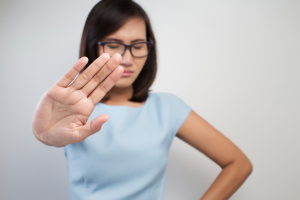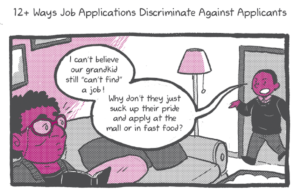
A person who appears to be sad, looking up, standing outside.
Being sexually assaulted can turn your world upside-down.
It can also make your mind buzz with questions: Why did they do that to me? Why now? Is it my fault? Was it really rape? How am I meant to react? Should I tell people?
As a rape victim who’s done a lot of gender-based and anti-rape activism, I’m often approached by survivors and victims who want answers to these questions.
And the question survivors and victims ask me most often is whether they should report their rape.
Indeed, whether or not we should report our rape is a really tricky conundrum. On one hand, we hope reporting rape will bring us justice. On the other hand, we often hear of survivors and victims being re-traumatized by the reporting process.
Because there’s a lack of constructive, truthful advice out there, and because I’ve struggled with this same question myself, I’m writing this article to help folks who are struggling with this difficult decision.
To clarify, this article is not meant to tell you whether you should report your rape or not. That’s your choice entirely.
Instead, it’s going to offer some reflective questions that will help you figure out if you want to report it.
It’s important to remember that your decision is yours. No matter what your decision is, no matter how you decide, you deserve to be supported in making it.
So here are some questions to consider:
1. What Is the Reporting Process?
Before you decide whether you want to report your assault, you should have an idea of what the reporting process is like.
Are you reporting to the police, or to another authority like a university tribunal? What are the laws and policies surrounding assault?
Do you have to provide medical evidence for your report to be taken further? Will you be cross-examined? Is it possible to report for statistical purposes without pursuing charges, if that’s something you want to do?
It’s okay if you don’t have answers to all of these questions right now, but you can try to find out.
Understanding the process means you’re better equipped to make a decision.
I’ve worked with a number of victims and survivors who didn’t really understand the reporting process until they were in it. Some say that they wouldn’t have reported their assault if they knew the truth. Others said they expected it to be way more complicated and lengthy.
Unfortunately, it’s difficult to gather these facts, because this sort of information isn’t always a quick Google away.
If you can’t find enough information on the process online, try to connect with NGOs, advocacy groups and activists who could assist you.
2. Are There NGOs in Your Area That Could Help You?
It’s natural to feel discouraged from reporting if you don’t feel like you have enough professional support.
But if you look for support, you might be pleasantly surprised by the amount of help out there.
People often don’t realize that there are many organizations, support groups and projects that work to support survivors and victims of assault. They often do this by providing legal advice and counseling services.
If you’d like to report your rape but you feel unprepared, find out if there’s a local NGO or support group and whether they can help you. They’ll also be able to provide you with specific information about the laws in your country or region.
If you don’t know where to start looking, you can try calling a sexual assault hotline to find out if they know about your area or can connect you with an organization that does. You could also search for a local abuse support agency here.
Even if you don’t want to report, you could benefit greatly from their services, so I really encourage you to connect with them if you can!
3. Do You Have an Adequate Support Network?
The support of NGOs and advocacy groups is great!
But I recommend creating a support network, including more personal contacts, to provide you with company and compassion while you go through the reporting process.
I understand that you might be afraid to tell your loved ones about your assault.
If your loved ones don’t know how to support you, you can send them resources that will help them figure out how to do so. This can include links to helpful articles or phone numbers for anti-rape organizations.
And if people blatantly don’t want to support you, it’s okay to set boundaries with them – especially if they’re blaming you or doubting you.
For a support network, you might want to look beyond your immediate family and friends. Support groups might help you make new friends.
You also might want to use social media to reach out to people who do advocacy work, as they could help you or direct you to someone you can.
Finding a support network is a good way to prepare yourself for the difficulties of reporting.
Whether you report or not, support networks are super important. You’re about to undergo a journey of healing, and it’s really difficult to do it alone.
During stressful times, drawing on the healing power of community can be absolutely essential.
4. What Outcome Do You Want – And What Outcome Might You Get?
I’ve been assaulted a few times, but I’ve only reported my assault once – and that was to university authorities. I didn’t want my perpetrator in jail.
This was for a few reasons. Firstly, I believe that the prison system is a part of rape culture, not a cure for rape culture, and I didn’t believe prison would rehabilitate him. Secondly, I felt like if he were jailed, he would be out in a few years’ time. Either way, it wouldn’t help me.
So, while I completely understand and support those who want their perpetrators to be jailed, I realized that a positive outcome of the trial – that is, him being jailed – wouldn’t bring me any joy.
Mia, a rape survivor, says that if she thought this through before reporting, she wouldn’t have reported.
“Only once I was in the middle of the trial did I realize that I didn’t know what I wanted,” she said. “I reported out of a sense of duty, and I felt like I had to do it… I didn’t think about what outcome would satisfy me, if any outcome could.”
Mia says that eventually the trial felt really pointless, which worsened her depression and PTSD.
If you want your perpetrator to be convicted, ask yourself what the likelihood of that outcome is.
In some cases, there is plenty of evidence against a perpetrator. In this case, go for it.
The unfortunate reality of our so-called justice system is that the conviction rate for rape is incredibly low – and that’s a reality you need to be prepared for.
This said, you might want to report your assault even if there is a low chance of your perpetrator being convicted. This is entirely your choice, and I support it, but make sure you’re emotionally prepared for a negative outcome, too.
5. How Will Reporting Affect Your Wellbeing?
In this situation, the most important person is the victim or survivor. You need to be your own first priority.
Because of this, it’s imperative that you think about how reporting will affect all aspects of your life. If you predict that there might be a negative impact on you, try to prepare yourself for that by seeking support.
Firstly, think about your emotional and psychological health. If you have pre-existing mental illnesses, the stress could aggravate your state.
It’s important to seek help – whether it’s therapy, support groups, medication or other forms of help – during this time.
The truth is that reporting sexual assault takes a massive toll on you, whether you go through with a trial or not. It’s important to consider whether you have the emotional capacity to handle it or not.
Please know that if you don’t have the emotional capacity to report your assault, it doesn’t make you weak, cowardly or any less valuable. It means you’re listening to your body’s intuitive wisdom and taking care of your needs, which is wonderful.
Secondly, think about the financial impact of reporting. Will reporting your rape and pursuing charges cost you anything?
I don’t necessarily mean in terms of direct costs such as lawyer’s bills. Will pursuing charges mean you have less time to work or study?
Sometimes, especially when sexual assault takes place within the family, we are financially dependent on our perpetrators. This puts us in an extremely difficult position. Richard*, a male rape survivor, told me that he had to figure out another plan before he reported his rape.
“My uncle was my rapist. He was also the breadwinner of our family,” Richard says. “When I first thought about reporting my rape, I realized having him in jail would leave my mother without a home. I sought help from a local organization to make sure she was taken care of before I reported it.”
Thirdly, think about the effect on your social life. Will reporting your assault mean you’re ostracized by your family or community?
In that case, is it possible for you to find the support and compassion of others – perhaps a local community of activists, extended family members, online groups, or friends who support you?
***
My comments might make it seem like I’m discouraging folks from reporting their assault. I’m definitely not trying to do that, but the reality of our system is that it’s really hard to report sexual assault.
If it looks like I’m saying that there are many reasons why people shouldn’t report their rape, that’s because the system is designed to re-victimize and discourage us from seeking true justice.
This is all the more reason why anti-rape activism and advocacy is really important.
If you decide not to report, you might feel really demotivated. We’re often shamed into reporting our rape: We’re told we need to report our rape to prevent others from being hurt, and to heal.
I want you to know that the perpetrator doesn’t have to be in jail for you to heal.
You don’t have to report your rape to speak out about it, either – I’ve personally never gone through with pursuing charges, but I’m still a vocal activist.
Maybe you’ve gone through all these questions and they suggest you shouldn’t report it, but you feel like you want to do so anyway. That’s okay – it’s your decision.
Maybe you have an immense support network, a great deal of evidence to support your report, and access to legal resources. Despite this, you might decide not to report your rape. And once again, that’s okay, because it’s your decision.
No matter what you decide, you deserve a lot of love and support.
* Not their real names.
[do_widget id=’text-101′]
Sian Ferguson is a Contributing Writer at Everyday Feminism and a queer, polyamorous, South African feminist who is currently studying towards a Bachelor of Arts majoring in English and Anthropology. Originally from Cape Town, she now studies at Rhodes University in Grahamstown, where she works as vice-chair of the Gender Action Project. She has been featured as a guest writer on websites such as Women24 and Foxy Box, while also writing for her personal blog. Follow her on Twitter @sianfergs. Read her articles here.
Search our 3000+ articles!
Read our articles about:
Our online racial justice training
Used by hundreds of universities, non-profits, and businesses.
Click to learn more




















